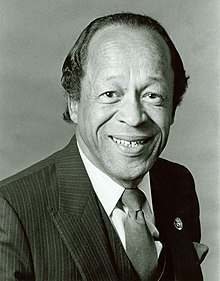Gus Savage: Difference between revisions
m Robot - Moving category African Americans in the United States Congress to African American members of the United States Congress per CFD at Wikipedia:Categories for discussion/Log/2009 March 26. |
Wikipedia:Categories for discussion/Log/2009 April 21, replaced: Category:African American members of the United States Congress → Category:African American using AWB |
||
| Line 42: | Line 42: | ||
[[Category:1925 births]] |
[[Category:1925 births]] |
||
[[Category:Living people]] |
[[Category:Living people]] |
||
[[Category:African American members of the United States |
[[Category:African American members of the United States House of Representatives]] |
||
[[Category:American military personnel of World War II]] |
[[Category:American military personnel of World War II]] |
||
[[Category:American newspaper editors]] |
[[Category:American newspaper editors]] |
||
Revision as of 16:10, 1 May 2009
This article may be confusing or unclear to readers. (March 2008) |
Gus Savage | |
|---|---|
 | |
| Member of the U.S. House of Representatives from Illinois's 2nd district | |
| In office January 3, 1981 – January 3, 1993 | |
| Preceded by | Morgan F. Murphy |
| Succeeded by | Mel Reynolds |
| Personal details | |
| Political party | Democratic |
Augustus Alexander Savage (born October 30, 1925) is a former Democratic member of the United States House of Representatives from Illinois.
Savage was born in Detroit, Michigan and graduated from Roosevelt University. He served in the United States Army from 1943 to 1946. He worked as a journalist from 1954 to 1979, owning a chain of community weekly newspapers in the Chicago area. He was unsuccessful in his candidacy for the House of Representatives in 1968 and 1970, losing the Democratic primary both times. Savage won election to the House in 1980, representing the 2nd District on Chicago's south side. He caused controversy being a critic of Israel and supporting the Palestinians. Savage also gave a speech where he listed the names of all of the Jewish donors living outside of Chicago area who donated money to his opponent's campaign. This led to a backlash and claims that only white people could be racist. The press claimed that Savage made statements against both white and Jewish people that were considered to be racist and antisemitic. In 1989, Savage was accused of trying to force himself on a female Peace Corps worker in Zaire. Savage denied these allegations and blamed it on the "racist press." In January 1990, the House Ethics Committee decided that the events did occur, but it did not take disciplinary action because Savage wrote a letter of apology to the woman.
Savage had long been controversial even in his own district, never winning a primary election with more than 52% of the vote, and usually facing multiple challengers. Before the 1992 election, his district was extended further into Chicago's south suburbs due to redistricting, and Savage faced Mel Reynolds in the primary election; Reynolds had previously challenged Savage in 1988 and 1990. Savage claimed that "racist Jews" were donating to Reynolds, and that Reynolds was involved in a drive-by shooting, which some aides claimed happened due to Savage's remarks. Savage accused Reynolds of staging the shooting, but lost the election by a margin of 63%-37%.
External links
- 1925 births
- Living people
- African American members of the United States House of Representatives
- American military personnel of World War II
- American newspaper editors
- Antisemitism
- Politicians from Chicago, Illinois
- Congressional scandals
- Illinois Democrats
- Members of the United States House of Representatives from Illinois
- Sex scandal figures
- Roosevelt University alumni
- United States Army soldiers
